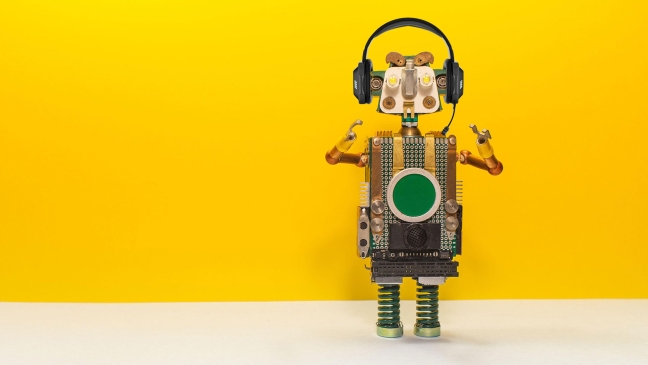
Why the rise of ChatGPT should liberate education - not scare it

Science fiction writer Arthur C. Clarke once observed: “Any sufficiently advanced technology is indistinguishable from magic.”
Step forward ChatGPT, a chatbot launched in November by artificial intelligence research laboratory OpenAI, whose founders include Elon Musk.
If you haven’t tried it out, you really should. Ask any question on any subject and a well-written answer appears in front of you - as if by magic - within a few seconds.
ChatGPT is the subject of media interest because of the danger that it could be used by students to pass off the chatbot’s answers as their own work.
There’s a risk of that happening, of course, as there always is with new technology. But the broader implications of ChatGPT and similar technologies are so much more interesting than that.
Light years ahead
In short, it shows us - not for the first time - that we simply must change the way that we do learning and assessment. The GCSE system, in particular, is hopelessly out of date. It is a pen-and-paper exam rooted in a 1950s conception of schooling.
In recent years, it has been turned into a relentless grind by government reforms, which have beefed up the amount of content that has to be memorised and the number of exams that have to be taken.
ChatGPT, and much of the other software developed by tech industry wizards, is light years ahead.
Memorising and regurgitating information have long been debatable necessities - certainly since the advent of the internet, if not before. Now, when technology can do the heavy lifting of factual recall in the blink of an eye, what is the point of making children commit tracts of information to memory so that they can trot them out in an exam?
Without jettisoning some core knowledge, greater emphasis should be placed on how we find information, how we assess whether it’s trustworthy or not, and how we, the humans, outflank the robots.
Liberating force
So, let’s accept that technology can be a liberating force to allow us to focus on learning the skills that matter - one of which is the ability to navigate the digital world. For example, ChatGPT is very good, but it is not perfect.
Indeed, OpenAI acknowledges: “ChatGPT sometimes writes plausible-sounding but incorrect or nonsensical answers.”
I thought I’d test its capacities with a spontaneously selected, completely random question: “Who is Geoff Barton, general secretary of the Association of School and College Leaders?”
Here’s what an apparently soulless algorithm told me:
“Geoff Barton is the general secretary of the Association of School and College Leaders (ASCL), a professional association for school and college leaders in the United Kingdom. He took up the role in 2014. Prior to this, he was the headteacher of King Edward VI School in Bury St Edmunds, Suffolk, a position he held for 11 years. Barton is a well-known figure in the field of education in the UK, and is frequently quoted in the media on issues related to education policy and school leadership.”
It took a few seconds to generate this response, which is extraordinary. But there are two small inaccuracies. I actually took up the role of ASCL general secretary in 2017, not 2014, and I was headteacher of King Edward VI School for 15 years, not 11. Plus, it failed to reference my manly good looks.
Lesson for learners
Of course, ChatGPT will doubtlessly improve as the technology develops, but the lesson for learners is not to rely on single sources and to cross-check and verify facts.
Knowing and being able to do this then is a much more useful skill than memorising the factual content of a biography - even mine.
This falls into the realm of critical thinking and problem solving - the ability to analyse, evaluate and come up with solutions. These are skills that employers often identify as very important, and they are not things that machines can do.
Certainly, machines can do a lot. They can sort and sift millions of lines of data, for example, but it is human beings who have to make sense of how that data relates to the real world and what it tells us.
And it is humans who are needed to work out how to improve a company’s supply chain, or diversify a business, or boost pupil attendance, or bring down crime rates in a community, or reduce hospital waiting lists, or solve the thousands of other challenges that have to be solved in every part of our economy and society.
‘Write me a poem about fish’
Another skill that technology cannot deliver is creativity. At least not yet. There is software that can have a stab at writing a song or poem - including ChatGPT - but my instinct is that it will always feel less than human.
Ever the English teacher, I decided to set ChatGPT another test: “Write me a poem about fish,” I said.
Here are a couple of stanzas:
In the depths of the sea,
Where the water is blue,
Lives a creature so graceful,
That’s known as the fish.
With scales that shine bright,
And fins that cut through the waves,
They swim in schools or alone,
In oceans and rivers and caves.
No, it’s not Wordsworth. But it is utterly astonishing that a chatbot comes up with this in an instant, even if it obviously lacks emotional depth.
Similarly, machines cannot replicate the creativity required in many other fields. They cannot, for example, come up with an original idea for a new innovation in business, commerce and technology. We need entrepreneurs to do that, human ones.
Neither can machines - on their own - do the range of skills that our economy and society need.
They cannot build houses, or bridges, or roads, or design a new electric car that captures the imagination of the public, or police the streets, or put out fires, or treat people who are ill and take them to hospital, or care for and teach children, or style your hair, or cook your meal in a fancy restaurant.
Belated and lacklustre
This means that, in this technological age, many deeply human skills and abilities take on greater importance than ever, something that does not fit with the government’s emphasis over the past decade on traditional academic disciplines.
The government, and traditionalist supporters, will of course insist that our curriculum and assessment system are not focused on memorisation but on the application of knowledge.
They’ll say that through the new T-level qualifications, and other reforms, they are championing skills education.
And indeed there is much that is good about the current curriculum, and there is indeed a new drive on skills, even if somewhat belated and lacklustre.
The world of tomorrow
But ChatGPT and its digital peers surely reinforce the sense that there needs to be a proper review of what we teach and how it is assessed in the context of the dazzling technological revolution that is whizzing past us, a review that identifies what we should do both less of and more of, and that embraces and invests in technology.
The children of today need to be ready for the world of tomorrow - whatever it may be. Knowledge, after all, is power.
For them, technology cannot be left to be indistinguishable from magic.
Geoff Barton is general secretary of the Association of School and College Leaders
You need a Tes subscription to read this article
Subscribe now to read this article and get other subscriber-only content:
- Unlimited access to all Tes magazine content
- Exclusive subscriber-only stories
- Award-winning email newsletters
- Unlimited access to all Tes magazine content
- Exclusive subscriber-only stories
- Award-winning email newsletters
You need a subscription to read this article
Subscribe now to read this article and get other subscriber-only content, including:
- Unlimited access to all Tes magazine content
- Exclusive subscriber-only stories
- Award-winning email newsletters
- Unlimited access to all Tes magazine content
- Exclusive subscriber-only stories
- Award-winning email newsletters
topics in this article




